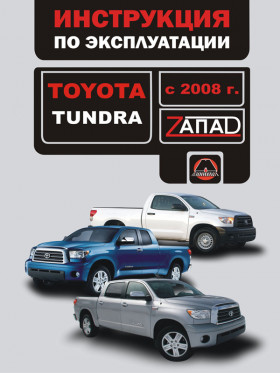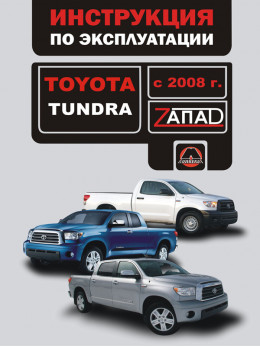Toyota Tundra since 2008, owners e-manual (in Russian)
Only original manuals
Available immediately after payment
Full compliance with the paper edition
100% protection of your payments
Publisher: © "Monolith"
ISBN: 978-921-0174-56-5
Number of pages: 386
Format: file PDF
About the manual
Type: 1GR-FE / 2UZ-FE / 3UR-FE
Displacement: 4.0 / 4.7 / 5.7 L.
In the manual you will find
- Information on self-service car
- Information on the design of the car and how to prevent failure
- The information for the trip to the service station, if the self-repair is impossible
Only original manuals
Available immediately after payment
Full compliance with the paper edition
100% protection of your payments
Publisher: © "Monolith"
ISBN: 978-921-0174-56-5
Number of pages: 386
Format: file PDF
About the manual
Type: 1GR-FE / 2UZ-FE / 3UR-FE
Displacement: 4.0 / 4.7 / 5.7 L.
In the manual you will find
- Information on self-service car
- Information on the design of the car and how to prevent failure
- The information for the trip to the service station, if the self-repair is impossible
Content
Control elements and devices
-
Overview of controls and devices
- Overview of the dashboard
- Overview of the upper console and steering wheel controls
- Overview of the instrument panel
- Signal indicators on the dashboard
-
Doors and keys
- Keys
- Immobilizer system
- Control panel
- Side doors
- Power windows
- Rear window
- Rear window with servo drive
- Backside
- The hood
- Anti-theft System
- Fuel filler cap
- Panoramic sunroof with servo drive
-
Passive safety system
- Seats
- Front seats
- Driver memorization system
- Back seats
- Headrests
- Armrest
- Seat heating
- Seat belts
- SRS airbags
- Baby seats
-
Steering wheel and mirrors
- Tilting the steering wheel
- Tilting the telescopic steering column
- Automatic tilting and telescopic steering column
- External mirrors
- Rear-view mirror with anti-reflective effect
- Sun visors
- Cosmetic mirror
-
Lighting and wipers
- Headlights and direction indicators
- Light alarms
- Illumination of the dashboard
- Front fog lights
- Interior lighting
- Personal lighting
- System of illumination at opening of doors
- Cargo lighting
- Illumination of the space near the driver's door
- Windscreen wiper and washer
- Heated exterior mirrors and windshield defroster
-
Indicators, measuring instruments and signal indicators
- Fuel consumption indicator
- Coolant temperature gauge
- Engine oil pressure gauge
- Transmission fluid temperature indicator
- Voltmeter
- Tachometer
- Odometer and two travel counters
- Multi-information display
- Signal indicators and beeps
-
Ignition switch, gearbox and parking brake
- Ignition switch
- Automatic transmission
- All-wheel-drive system
- Anti-slip system
- Differential system for increased friction
- Electronic vehicle stability control
- Tire pressure display system
- Parking brake
- Cruise control
-
Audio system and telephone system HANDS-FREE
- Configurations
- Using an audio system
- Steering wheel audio controls
- Adapter for connecting additional equipment (AUX)
- Rear seats multimedia system (RSES)
- Practical tips for managing the audio / video system
- Telephone system Hands-free
-
Air conditioning
- Manual air conditioning
- Controls
- Airflow regulator settings
- Practical guidance
- Air conditioning with automatic climate control
- Controls
- Airflow regulator settings
- Practical guidance
- Dashboard dashboards and rear deflectors
- Air conditioner filter
-
Other equipment
- Optional display
- Parking assist system
- Compass
- Cigarette lighter and ashtray
- Sockets (12 V, direct current)
- Sockets (115 V, alternating current)
- Glove boxes
- Homelink transceiver
- Auxiliary compartments
- Sunglasses holder
- Business card holder
- Handle holder
- Compartment for handkerchief
- Central console
- Front coasters
- Rear coasters
- Bottle holders
- Storage bays
- Backrest table
- Luggage hooks
- Hooks for fastening packages
- Floor mats
Before starting a car
- Precautions regarding SUVs
- Run-in period
- Fuel
- Shut-off valve for fuel pump
- Operation of a car abroad
- Three-component catalytic converter of exhaust gases
- Precautions for exhaust gases
- Information on engine oil consumption
- Iridium spark plugs
- Iridium candles with an elongated electrode
- Braking mechanism
- Brake pad wear indicators
- Rear footrest
- Your car's identification number
- Part identification numbers
- Suspension and frame
- Tire information
- Maximum permissible carrying capacity of a car
- Type of tire
Starting traffic
- Before starting the engine
- How to start the engine
- Practical guidance for driving on different roads
- Precautions for off-road driving
- Practical guidance for winter traffic
- Towing
- Towing a trailer
- How to reduce fuel consumption and how to extend the life of the car
In an emergency situation
- If your car's engine does not start
- If the engine sticks while the vehicle is moving
- If you can not increase the speed
- If your car is overheated
- If the wheel is flat
- If your car is stuck
- If your car needs towing
- If you can not move the selector lever
- If you lost your keys
- If you lose control panel
Preventing corrosion and caring for the appearance of the car
- Protecting your vehicle from corrosion
- Washing and polishing your car with a wax paste
- Interior cleaning
Maintenance and car care
- Maintenance requirements
- General maintenance
- Does your car need repair?
- Control of harmful substances of exhaust gases
Self-service car
-
Introduction
- Engine compartment overview
- Fuse location
- Precautions for self-maintenance
- Spare parts and tools
-
Self-service vehicle
- Checking the engine oil level
- Checking the engine coolant level
- Checking the radiator and condenser
- Checking the brake fluid
- Check of a hydraulic oil of the hydraulic booster of a steering
- Checking tire pressure
- Checking and changing tires
- Rearrangement of wheels
- Installation of winter tires and snow chains
- Replacing disks
- Precautions for discs
-
Electrical components
- Checking the battery status
- Precautions for recharging the battery
- Checking and replacing fuses
- Adding washer fluid
- Lamp replacement
Car specifications
- Overall dimensions
- Car load capacity
- Towing capacity
- Engine
- Fuel
- Technical data
- Tires
- Fuses
- Overview of the dashboard
- Overview of the upper console and steering wheel controls
- Overview of the instrument panel
- Signal indicators on the dashboard
Write a review
Your Name:
Your Review:
Customers reviews
Подробная книга по эксплуатации, расписаны все кнопочки и регулировки. Покупка не разочаровала))))
Зачетная книжечка, особенно для "блондинок"






